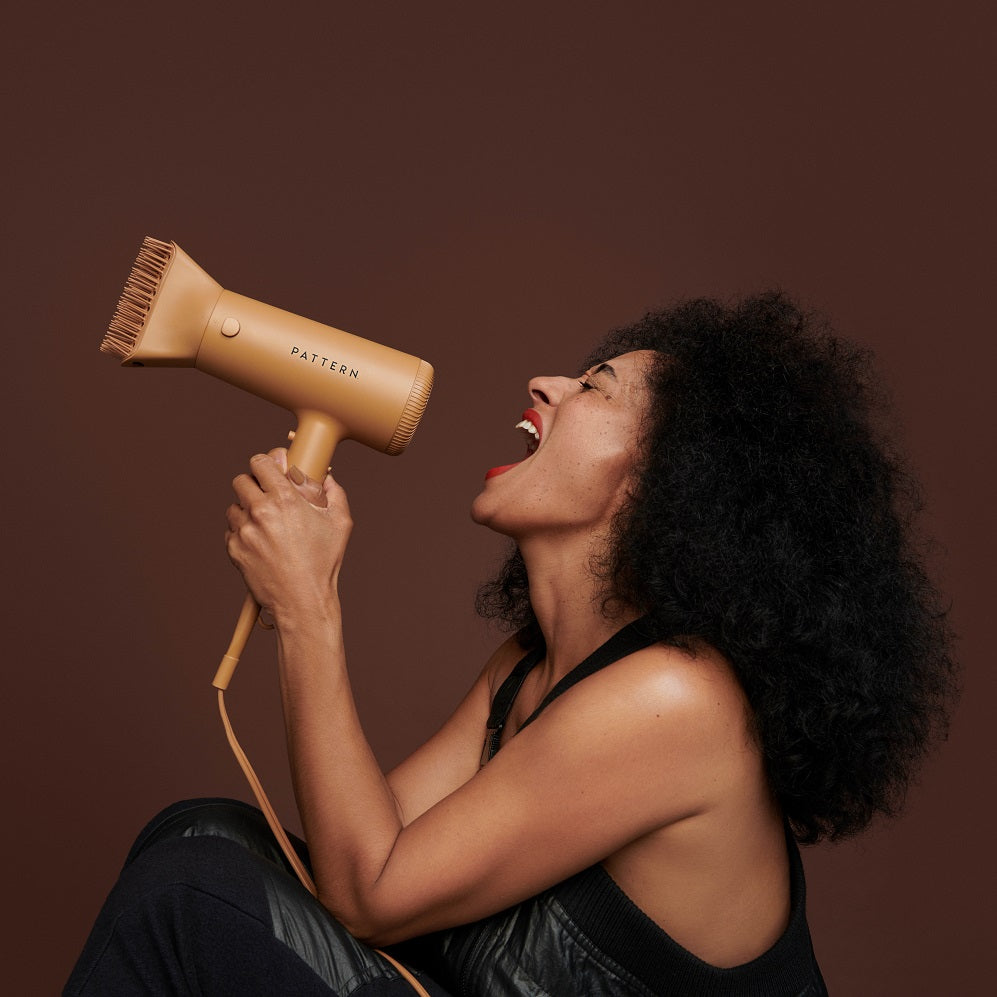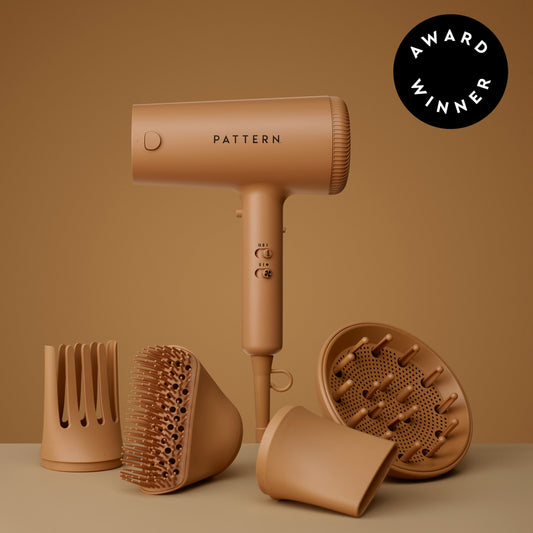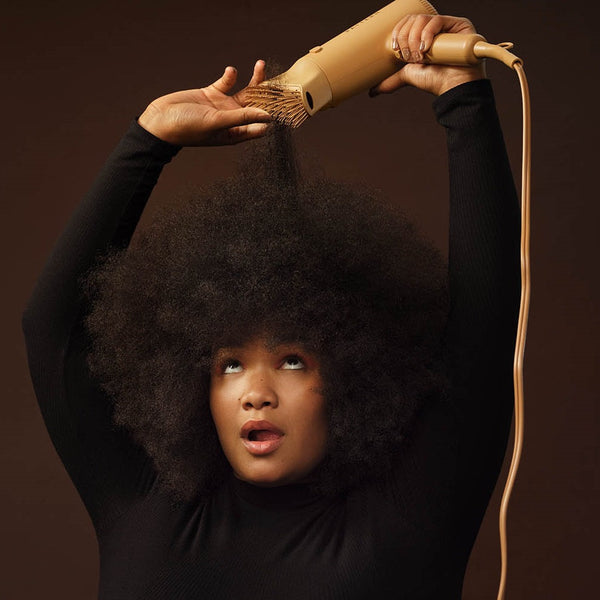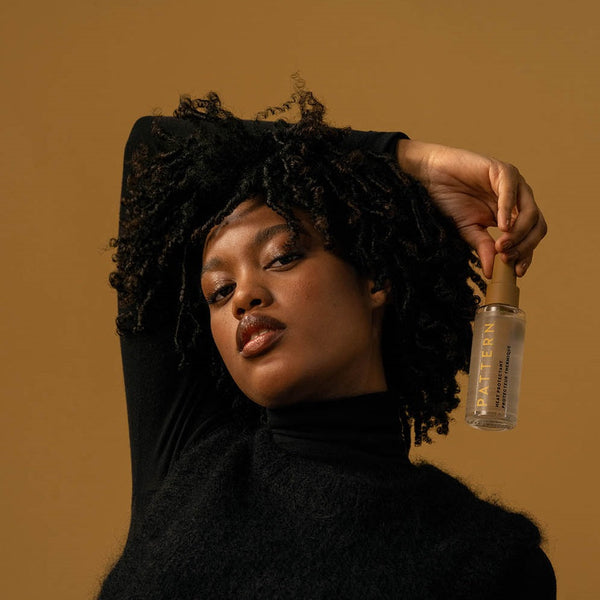You know when your hair is feeling & looking fabulous. Your curls are bouncy & beautiful, your scalp is super healthy & you’re practically redefining shine.
But we also put our hair through a lot of wear and tear during styling. Flat irons, curling irons, blow dryers, color, chemical treatments, even sunshine—all can cause your hair to start looking a little under the weather & may lead to hair breakage & dullness.
Rest assured that heat-damaged hair isn’t a life sentence. With the right hair product, techniques & preventative measures, you can easily restore your hair’s vitality & get back to that gorgeous hair that invites envy. Read on for our expert tips on how to fix heat damaged hair & our answers to your most urgent questions on the matter.
But First: What is Heat-Damaged Hair?
Before we dive into how to help heat damaged natural hair, let’s define what heat damaged hair looks like.
Heat damage happens when the cuticle of your hair becomes parched, usually from over-styling.1 This can alter the proteins in your hair & change its structure, shape & resilience. The signs of heat damage can run the gamut from subtle to obvious & may include:
- Breakage
- Split ends
- Hair that feels brittle & dry
- Hair that tangles easily
Luckily, unless the damage is extreme, all it takes is a little time & TLC to get your body & gloss back.
How to Fix Heat-Damaged Natural Hair: 6 Expert Tips
If you’re experiencing any of the signs of heat-damaged curls, you may be tempted to cut off your locks for a complete refresh. Our advice? Though you would look gorgeous with a short cut, give these tips a try first.
#1 Replenish Moisture
Heat damaged curly hair is thirsty hair.
This isn’t always the fault of overdoing it with chemical treatments, either: Some hair experts report that the innate shape of curls means it’s more difficult for the natural oils produced by your scalp to make their way down the hair shaft.2
Fortunately, PATTERN’s Treatment Mask was designed to repair the harm that heat can cause. Rich in moringa seed extract & rice water ferment, this bestselling mask quenches your natural hair’s thirst & encourages both softness & strength.
#2 Hydrate Your Hair Frequently
Heat-damaged strands don't just need a one-and-done hair treatment mask. It requires ongoing moisture. A hydrating mist that works on dry & wet hair is one of the golden tickets to claiming your silky strands once again.
PATTERN’s Hydrating Mist, for one, contains three super-nourishing ingredients to help re-energize heat-damaged natural hair:
PATTERN’s Hydrating Mist is incredibly versatile, too: You can use it to bring life back to your hairstyle before you style your hair & between washes.
#3 Shield Your Strands From Heat
It seems obvious that if you have heat-damaged hair, you should dodge heat entirely.7
But we’re also realistic. Whether you have an upcoming wedding or are in need of a quick fix for a bad hair day, eschewing heat might be totally unavoidable.
If you must use heat to style your hair, we get it—& we also have some solutions:
#4 Call Upon Protective Hairstyles
The signs of heat-damaged hair are basically your hair’s way of saying: Pssst, I need a break. And it makes sense; just think of how our muscles get stressed when we work too much without giving them a respite between trips to the gym.
This is where protective styles for natural hair are your best friend—or at least your hair’s BFF. Not only do they look chic, but they also decrease wear & tear & reduce exposure to natural but damaging environmental stressors like the sun, heat & cold. Indeed, it’s one of the smartest ways to treat heat-damaged curly hair.10
A few to try:
- Faux locs
- Braids
- Bantu knots
- Twists
- Buns
- Afros & puffs
Some of these protective styles, such as box braids, can last up to three months, which will give your heat-damaged natural hair ample time to heal—particularly if you accelerate the healing process with ultra-nurturing products.
#5 Care for Your Hair With a Hot Oil Treatment
Treat heat-damaged curly hair—or hair, period—with heat?
Yes—when nourishing plant ingredients are warmed up, they can better penetrate your hair’s cuticle to provide nourishment. In fact, hot oil treatments have a number of benefits:11
- Increases hair strength & flexibility
- Helps ward off breakage & split ends
- Seals in moisture
- Promotes scalp circulation, encouraging nutrients to reach your roots
PATTERN’s Jojoba Oil Self-Heating Packs contain essential fatty acids & natural waxes that may rejuvenate your hair’s suppleness & shine while also providing you with a spa-grade experience from the comfort & convenience of your home.12
#6 Wash Your Hair Less Frequently
Freshly-washed hair feels & smells marvelous but hair that has been compromised from excessive heat needs a boatload of moisture—including the oils naturally produced by your scalp. Overwashing can strip your hair of these natural oils & further deplete your hair of hydration.
To this end, extend the amount of time between washes & avoid shampoos that have parabens & sulfates, which can further dry out your mane.
When you do wash your hair, reach for a product teeming with strength-promoting proteins & humectants. The former will promote resilience; the latter will help seal in moisture.
With all of this in mind, give PATTERN’s Hydration Shampoo a whirl. This creamy, decadent shampoo contains Aloe Vera leaf juice, honey & coconut oil to cleanse your hair without robbing it of its oils. Top it off with an Intensive Conditioner tailored for tight textures & rinse with cool water to help your hair retain moisture. You may see–& feel—your hair on the up & up.
How To Repair Heat Damaged Hair: Your FAQs
When your curls don’t have that juiciness you’re used to, it can bring up a ton of questions. Here are a few answers to the most common:
How Long Does it Typically Take For Hair to Recover From Heat Damage?
This depends on the severity of the damage, your hair’s elasticity & the steps you take to nourish it in the aftermath:
- With mildly heat-damaged hair, you may begin to see some improvement after your first treatment hair mask.13
- Moderately damaged hair may start to return to its “usual self” in two to three months after using heat with caution & twice-weekly treatments, especially if you use treatments & ingredients such as jojoba oil that are specifically targeted at rebuilding your hair’s protein & restoring its lipids.
- Deeply damaged hair will take longer, but this depends on your hair’s elasticity.
Will a Haircut Help Fix Heat Damage?
In a word, yes—at least the part you cut off. Some experts indicate that this is the only way to treat intensely damaged hair.
But you don’t necessarily have to lose your length. Give your hair a few months of affection & a couple doses of the right ingredients, & you may be surprised by how quickly it bounces (literally) back.
Restore Your Radiance with PATTERN
Heat-damaged hair may be prevalent but it certainly doesn’t mean it needs to be common for you. With patience, practice & key products, you can understand how to help heat damaged hair & regain your hair’s balance & beauty & even prevent damage from happening in the first place.
PATTERN’s assortment of curly hair stylers, treatments & tools can help you achieve this. Our new, masterfully-crafted HEAT collection paired with our products for heat damaged hair takes the fear out of heating tools & techniques so that you can relish the best of two worlds: the styles you want & healthy, luscious hair.
Elevate your hair care routine with PATTERN & experience the difference of products designed with curls, coils & tight textures in mind.
Sources:
- Watson, Kathryn. "Heat-damaged hair: how to repair it without a haircut." Healthline. 23 September, 2019. https://www.healthline.com/health/beauty-skin-care/heat-damaged-hair
- Forbes, Jihan. "The most common causes of hair breakage and how to fix them at home." Allure. 25 October. 2021. https://www.allure.com/story/reasons-your-hair-is-breaking-off
- Watson, Kathryn. "Aloe vera for your hair: what are the benefits?" Healthline. 15 October, 2020. https://www.healthline.com/health/aloe-vera-for-hair#benefits-for-hair
- Cherney, Kristeen. "Hair breakage: 12 possible causes and treatment." Healthline. 31 August, 2022. https://www.healthline.com/health/hair-breakage
- Iftikhar, Noreen. "Coconut oil for hair growth: research, efficacy, and more." Healthline. 11 December, 2019. https://www.healthline.com/health/beauty-skin-care/coconut-oil-for-hair-growth#for-the-hair
- Scissons, Claire. "Avocado oil for hair: benefits and how to use it." Medical News Today. 24 April, 2018. https://www.medicalnewstoday.com/articles/321606#benefits
- Lebsack, Lexy. "How to fix hair breakage." Byrdie. Updateds on 23 August, 2022. https://www.byrdie.com/hair-damage-101-how-to-fix-the-breakage-you-probably-dont-even-know-you-have
- Jackson, Amy Elisa. "Does heat protectant work & do I need it?" Pattern Beauty. 21 November, 2022. https://patternbeauty.com/blogs/news/does-heat-protectant-work?al_pg_id=dd86cc16-cade-4b10-906e-71430a542ce3
- Kedar, Namarta. "How to avoid heat damaged hair when heat styling your hair." Vogue. 23 September, 2022. https://www.vogue.in/beauty/content/how-to-avoid-heat-damaged-hair-when-heat-styling-your-hair
- Jackson, Amy Elisa. "Protective hairstyles 101." Pattern Beauty. 26 August, 2021. https://patternbeauty.com/blogs/news/protective-hairstyles-101?al_pg_id=dd86cc16-cade-4b10-906e-71430a542ce3
- Cherney, Kristeen."How and why to use a hot oil treatment for your hair." Healthline. 23 May, 2019. https://www.healthline.com/health/hot-oil-treatment-for-hair
- Wong, Cathy. "9 natural oils for better hair health." Very Well Health. Updated 17 January, 2023. https://www.verywellhealth.com/the-best-hair-oils-for-every-hair-type-4154056
- Moorhouse, Victoria. "How long does it really take to fix fried hair?" InStyle. 30 May, 2022. https://www.instyle.com/hair/how-long-does-it-really-take-fix-fried-hair




